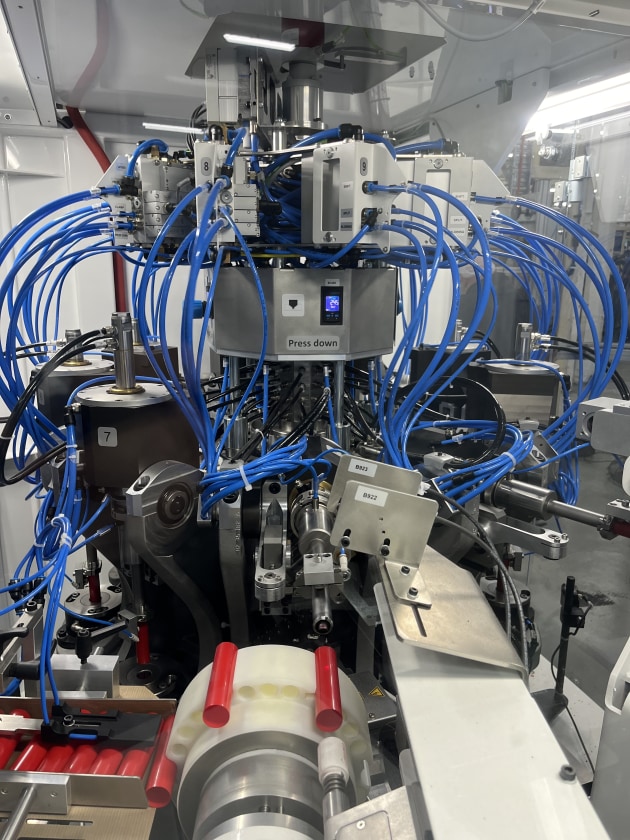Sydney-based tube manufacturer Impact International, a key supplier to many health and wellness brands, has made significant strides in enhancing its Smithfield production facility, investing over $4 million in the past 12 months.

Impact International’s latest substantial investment reflects the company’s dedication to improving local manufacturing capabilities, operational efficiency, and sustainability.
Among the key upgrades is the acquisition of a new tube heading machine from AISA, a trusted Swiss supplier that has partnered with Impact International for more than 40 years. This state-of-the-art machine is expected to elevate the company’s production capabilities, ensuring that it remains at the forefront of tube manufacturing technology.
In addition, the company has purchased its first electric injection moulding machine from Sumitomo Demag of Japan. This investment marks a shift towards more energy-efficient production processes, aligning with the company’s broader sustainability goals.
To meet the growing demand for its products, Impact International has introduced a new mould for 38mm flip top caps. This upgrade is crucial in enabling the company to keep pace with market needs and continue delivering high-quality products to its customers.
Recognising the importance of employee well-being, Impact International has also made significant improvements to its staff facilities. These upgrades include a new lunchroom, car park, and bathrooms, all designed to provide a more comfortable and modern working environment. In today’s competitive employment market, such amenities are increasingly valued by potential employees, particularly in a 24-hour production setting.
Moreover, the company has expanded its loading dock, adding over 1300 square metres of space. This new facility can accommodate up to four semi-trailers, greatly improving logistical efficiency and enabling the company to manage increased production volumes more effectively.
CHANGE DRIVERS
Explaining the motivation behind these investments, Aleks Lajovic, managing director of Impact International, says, “These investments were driven by a combination of increased product demand, the need to enhance operational efficiencies, and our unwavering commitment to sustainability. In addition to boosting our production capabilities, these upgrades are also designed to make us a more attractive employer in a competitive job market.”
Impact International has been at the forefront of Australian manufacturing since its establishment in 1958. The company was one of the first in the industry to address the challenges of sustainability and recyclability – issues that continue to shape the sector today.
“Sustainability and recycling are closely linked but present distinct challenges,” Lajovic notes. “It’s not just about what you manufacture; it’s also about how you manufacture it. Our investments in solar power, sustainable forestry, and the use of post-industrial recycled (PIR) and post-consumer recycled (PCR) materials are integral to our sustainability strategy. Additionally, developing recyclable tube designs helps our customers meet their own sustainability objectives.”
Lajovic emphasises that all investment decisions are carefully assessed for their potential to positively impact the company’s sustainability and recycling goals.
Looking ahead, Lajovic identifies several challenges facing local packaging manufacturers: “The erosion of the supplier base, high energy costs, a competitive labour market, significant government levies such as land tax, and a lack of recognition for Australian-made products are all pressing concerns for the industry.”
One area of particular concern is the sourcing of recycled materials. Lajovic says Impact International has made a strategic decision to purchase only Australian-made recycled PIR and PCR resins.
“We have made this decision to ensure we can guarantee the quality and authenticity of our materials. In our view, the overseas supply chain for PIR and PCR materials carries a much higher level of risk in terms of quality, efficacy, and control,” Lajovic explains.
He argues that if Australia is to develop a robust recycling system, “the government and the market should prioritise and promote packaging made locally using Australian-made recycled materials over those made with imported recycled content”.
As Impact International approaches its 67th year in the packaging industry, the company remains focused on innovation and sustainability. Further product developments are already underway, and Lajovic confirms the industry can expect more exciting advancements from this Sydney-based manufacturer in the near future.
PKN will continue to monitor Impact International’s progress, bringing the latest updates on the company’s innovations to the industry.
This article was first published in the September-October 2024 print issue of Packaging News, p36.






